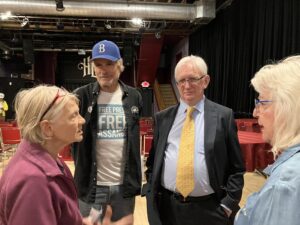
Former British ambassador to Uzbekistan and ‘War on Terror’ anti-torture whistleblower Craig John Murray led a discussion on the defense of Julian Assange and freedom of speech and the press with local activists. (Photo/Amy Blumenshine)
BY AMY BLUMENSHINE
On the recent anniversary of 9/11, over a hundred people came to hear whistleblower and former British ambassador Craig Murray at the Hook and Ladder. A Scotsman and career diplomat for the United Kingdom, Murray had been ambassador to Uzbekistan as our “Global War on Terror” was the excuse for that dictator to boil alive his opponents.
Murray’s mission while in the U.S., however, was to plead for protections for whistleblowers and the press who publish them – most especially Julian Assange. Assange has been in captivity – neither tried nor convicted – for over 13 years for publishing the truth about U.S. government crimes. Murray detailed the slow-motion execution that the U.S. and U.K. governments have waged on Assange. A U.N. special rapporteur on torture who investigated Assange’s treatment and condition has characterized it as that of torture.
Assange’s transparency-dedicated organization WikiLeaks published leaked documents revealing wrongful actions of various countries’ governments and corporations. The WikiLeaks revelations about U.S. torture, the Iraq War Logs, the Afghan War Diary, and even the political shenanigans of politicos earned him the vengeance of the security forces of the U.S., said Murray, and have resulted in the obviously unconstitutional assault on press freedom.
Murray also honored the late whistleblower Daniel Ellsberg who testified in defense of Assange near his own life’s end. The kangaroo U.K. court conducting the case for extradition attempted to sabotage Ellsberg’s testimony by allowing access to the 600 pages of evidence only the evening before he was to testify (online) at 5:30 a.m. Nevertheless, the elder whistleblower spent the night reviewing the information and delivered his countering testimony at the wee hour.
To the government’s claim that Assange endangered individuals, Ellsberg pointed out that no such victim had been identified whereas the post-9/11 internationally illegal U.S. wars – which the WikiLeaks revelations sought to end – have resulted in the deaths of at least one million people and displacement of over 27 million more.
Murray’s own story was that after exhausting internal channels to change his government’s support of the torturing dictator, he took the story to a British paper. There were repercussions and he was given seven years’ pay to resign early. His treatment was in contrast to that of Assange who withers, awaiting extradition for a possible U.S. trial, in Belmarsh maximum security prison with draconian threats on his life and liberty – all contrary to British law, explained Murray.
The horrific tortured deaths in Uzbekistan of which Murray had personal knowledge were excused and supported by the U.K. and U.S. as supportive of the War on Terror. In actual fact, these horrors were committed to terrorize the Uzbeks, maintaining the dictator’s rule while currying aid and political support from the U.S. and U.K. war-makers. Murray also knew that one of the victims, persecuted as being in al-Qaida, was actually a Jehovah’s Witness. Murray explained that George H.W. Bush had a financial interest in building the oil pipeline through Uzbekistan, which shared a border with Afghanistan. The geographic location facilitated profits from trafficking the opiate trade which produced over 90% of the global illicit trade during the U.S. occupation.
The local Southside connection is not just the opioid catastrophe here, but also the presence in our neighborhoods of so many Ecuadorian refugees. The Ecuadorian president, Rafael Correa, who offered asylum to Assange in the Ecuadorian London embassy also oversaw a major reduction in poverty in Ecuador. But U.S. covert actions helped effect regime change in Ecuador, Murray asserts. The asylum-offering Correa was succeeded by presidents who allowed U.S. surveillance within the embassy and ultimately expelled Assange, seizing his legal case preparation documents and giving them to the prosecution. (That action alone would cause dismissal of most trials.) The replacement Ecuadorian regime also instituted immiserating conditions which are triggering an influx of refugees in our city.
Another local impact, of course, is the chilling effect on all journalism of penalizing the publishers of truths that are embarrassing to the government. “A society that prohibits the capacity to speak in truth extinguishes the capacity to live in justice,” was a Chris Hedges quote offered by Coleen Rowley, local FBI whistleblower as she introduced the quickly organized event. Gary King, of Amnesty International, in preliminary remarks, noted that Assange was the epitome of what they call a prisoner of conscience: someone imprisoned by their government not for violence but for speaking inconvenient truths.
Murray quoted Assange: “If wars can be started by lies then wars can be ended by truth.” Murray urged all present to act if Assange is extradited to the U.S. He urged impacting the narrative on that day, including providing visuals of photographs of protests for alternative local media.
Murray left with this exhortation: “We need to rescue from persecution the leading proponent against war. This is the fight for truth, for justice, for the very principle of freedom of speech, against war, for the fundamental virtues in society that good people should be pursuing. I know that everyone here will be doing that with me.”






















